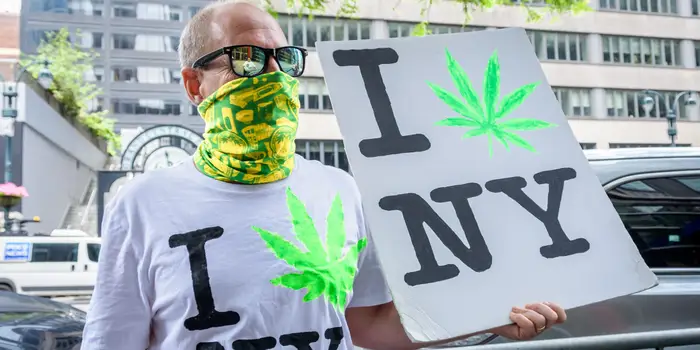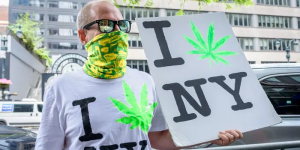
Written By: Matthew Hirsch

(and Washington D.C.) to pass legal weed legislation./ Erik McGregor/LightRocket via Getty Images
On Mar. 31st, Governor Cuomo signed a bill into law that would make the recreational use of marijuana legal in New York. Taxed at 13 percent, revenue from the newly legalized industry is expected to generate $350 million annually and create between 30,000 and 60,000 jobs.
According to a study by Seedo, a company that makes weed growth products, Gothamites smoked over 77 tons of Mary Jane in 2017, more than double any other city. While the legalization of cannabis is still a hotly debated topic, BC students had plenty to say on the subject.
“The criminalization of marijuana has historically targeted Black and brown communities, its legalization is the start. The next question is what will happen to those imprisoned for using it,” said freshman Fatimah Alwaqza. Along with legalizing recreational use, the bill also expunges the records of those convicted of possession under the current legal limit.
According to the American Civil Liberties Union, arrests for marijuana possession in 2010 made up over half of all drug arrests in the United States. This disproportionately affected Black people who are nearly four times more likely to be arrested, despite having about the same usage rate as white people. Around 107,000 marijuana convictions will be automatically expunged thanks to the new law. Third and fourth-degree criminal possession charges, as well as fourth and fifth-degree criminal sale charges, are set to be wiped from the record.
It’s no secret that cannabis use is common amongst college students. According to a 2018 University of Michigan survey, about 43 percent of full-time students used some form of weed in the previous year. College-age adults are more likely to use pot recreationally than any other age group. It’s no surprise that some students are excited about legal weed.
“I think it’s been a long time coming! I’ve seen people smoking in public in NYC for as long as I’ve been here,” said freshman Alexander Howe. “A lot of people, including myself, are into specific types of weed, certain kinds that are good for different situations and vibes. You can be sure to get that through a dispensary.”
State Assembly Majority Leader, and co-sponsor of the legalization bill, Crystal Peoples-Stokes, estimated it could take two years for legal sales to begin through dispensaries.
Though there are positives to New York “going green,” some students have their hesitations, fearing that legalization will lead to higher rates of DUI accidents. “I feel there are some negatives that go with any type of drug like alcohol, cigarettes, and others such as more car accidents that might occur due to the people that are driving under the influence,” said graduate student Allan Randall.
However, In 2017 the National Center for Biotechnology Information published a study on the rates of fatal car crashes after marijuana was legalized in Washington and Colorado. The results showed no significant correlations between legalization and an increase in car crash-related fatalities, though the study also stated that more research is required before there are definitive answers.
Another common fear surrounding marijuana is that it can cause depression if abused. This correlation between depression and marijuana use could be due to THC’s psychoactive dulling effects on emotions, and while some research suggests that cannabis users are diagnosed with depression at a higher rate than non-users, according to the Mayo Clinic, pot is not the direct cause of the depression.
“I think that legalizing weed is an amazing idea. It gets a lot of the crime associated with it off the streets, and the medicinal properties are very helpful in terms of mental and physical health,” said Randall. New York legalized weed for medical purposes in 2014, and according to the non-profit Marijuana Policy Project, almost 115,000 New Yorkers were prescribed medical cannabis as of December 2020.
New York is the sixteenth state to legalize the recreational use of cannabis. Colorado has generated over $2 billion in revenue since it legalized recreational marijuana in 2012. Though President Biden has a history of supporting anti-drug legislation, he has stated that he will pursue weed’s decriminalization and the expungement of marijuana-related convictions at the federal level, though it will still be illegal for minors and to drive while under its influence. Adults over 21 however can light up freely wherever it’s legal to smoke tobacco in New York from now on.
